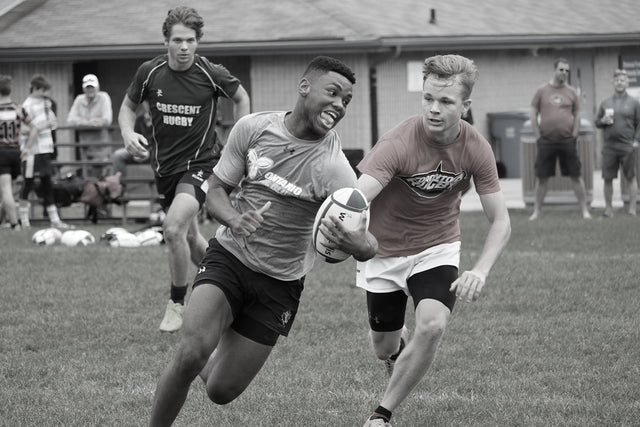Toronto Rugby Elite Reds Academy
TEACHING THE IMPORTANCE OF MENTAL HEALTH TO CANADA’S NEXT GENERATION OF RUGBY STARS
Written by: Brock Smith
“‘If it ain’t broke, don’t fix it.’ I hear that saying all the time,” grunts John Pryce, as if the adage has struck a nerve. “…and I hate it.”
As Toronto Rugby’s Director of High Performance, Pryce eschews complacency. He’s raring to build on his branch union’s strong foundation of 3,500+ minor and junior players - the highest branch union total for these age groups in Canada - and has a goal to convert as many of these players into future stars for Canadian national teams as possible, specifically within the Sevens game.
“We’re never going to grow the game, especially at the age-grade level, if we aren’t open to new ideas, or new schools of thought. So we’re shaking things up a bit.”
In terms of producing national-level athletes, few regions in Canada can boast a higher output of elite talent than Toronto Rugby, especially over recent years. Its clubs have served as the gateway to the game for some of Canada’s brightest sevens stars; now-household names like Lucas Hammond (Toronto Nomads), Ghislaine Landry (Toronto Scottish), John Moonlight (Ajax Wanderers) and Charity Williams (Markham Irish) all got their starts at clubs that play within Ontario’s largest branch union.

So how do you build on a program that’s seemingly working just fine?
For Toronto Rugby, its plan to emerge as a regional sevens juggernaut lies within a newly-created elite junior training program, with Pryce serving as the architect of its sevens academy for under-17 athletes on Rugby Canada’s high performance pathway.
The first-year academy, made up of 48 young men and women, offers many high-performance staples aimed at elite physical skill development: thorough training sessions aligned with Rugby Canada’s key themes and core skills, personalized strength and conditioning programs, and input from guest national team coaches like John Tait, Sandro Fiorino, and Andrew Hall.
But how do you unearth the next Landry or Moonlight?
To achieve this lofty goal, the academy is thinking outside the box by, well, championing thinking.
“We want to be the number one nationally-accredited sevens academy in the country by 2020. To reach this goal, we need to put a greater emphasis on training our athletes’ minds, as well as their bodies,” says Pryce.

Toronto Rugby is turning to sport psychology as their key to unleashing an x-factor in their athletes. Academy players will be reminded - more so than ever before - to take a break from the weights, put down the ball, take a deep breath, and reflect.
“If you look at top coaches in the game, they’ve realized that you can only change and affect so much on the field after the whistle blows and the match begins,” notes Pryce. “We don’t want to leave the mental side of the game to chance, so we’re using tools from the field of applied sport psychology to give our athletes an edge.”
Pryce has turned to a familiar face to lead the academy’s rollout of sports psychology and mental health training: Canadian women’s rugby trailblazer Dr. Natascha Wesch.
Wesch was a national team stalwart for more than a decade, notably leading Canada to two Women’s Rugby World Cups. She’s coached club, provincial, national, and university teams, and has been involved in the sport for more than 30 years. Along with her wealth of on-the-pitch experience, she’s also a highly-regarded mental performance consultant.
“With the help of Dr. Wesch, we’re creating a comfortable environment for our athletes, where they learn ways to manage competitive stress, improve confidence, and hone in on their concentration in an encouraging space.”
“Stress management is an example of the mental side of the game that coaches rarely talk about, yet it’s been something we’ve always seemed to just expect young athletes to know. It’s time to shine a brighter light on sports psychology. Mental skills, just like physical skills, require correct guidance and training.”

The Toronto Rugby Elite Reds Academy kicked off in early September, with initial tournament dates peppered throughout the fall. Hundreds vied for the 48 coveted roster spots; more than a dozen have been filled by players who have already accrued national age-grade program experience.
Time will tell if placing greater emphasis on sport psychology will yield the desired on-field results for the academy and its players, but Pryce notes that the off-field results make this a chance worth taking.
"The byproduct for our players is stronger self-confidence and self-esteem. These intangibles stick around long after the game is over, and they’ll help our young athletes become well-rounded in sport, and in life.”



